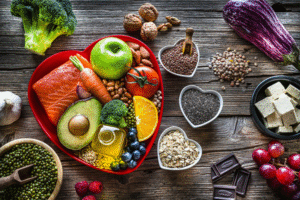You don’t need extreme cleanses or pricey supplements to detox your organs. Your body is equipped with its own detox system—what it needs is your support. By eating nutritious foods, drinking enough water, staying active, and making sustainable lifestyle changes, you can help your organs function at their best.
When your body is detoxifying efficiently, you’ll feel more energized, clearer in thought, and less prone to illness. The key is consistency—small steps over time create lasting change.
Here’s how to support each organ’s natural detox process and boost your immune system:
1. Liver – Your Body’s Chief Cleanser
The liver filters toxins, breaks down nutrients, and produces bile to aid digestion. When overloaded by alcohol, processed food, or chemicals, it can lead to fatigue, skin problems, and sluggish digestion.
Signs of a sluggish liver:
Constant tiredness
Digestive discomfort or bloating
Skin breakouts or rashes
Unexplained weight gain
Ways to support liver detox:
Drink plenty of water, especially warm lemon water in the morning.
Eat liver-supportive foods like leafy greens, cruciferous veggies, garlic, beets, citrus fruits, and turmeric.
Avoid alcohol and processed food.
Consider herbs like milk thistle and dandelion root.
Get regular exercise to improve circulation.
2. Kidneys – The Body’s Natural Filters
Kidneys remove waste and regulate fluid and minerals. Poor hydration, too much salt, and toxins can wear them down, causing swelling, tiredness, or urine changes.
Signs your kidneys need attention:
Swelling in extremities
Dark or cloudy urine
Low energy
Frequent urination issues
Kidney detox tips:
Drink 8–10 glasses of water daily.
Limit salt; use herbs and spices instead.
Add kidney-friendly foods like cucumbers, berries, parsley, and celery.
Reduce intake of alcohol, caffeine, and painkillers.
Try herbal teas like nettle or dandelion.
3. Lungs – Clearing the Air
Lungs deliver oxygen and release carbon dioxide. Pollution, smoking, and allergens can reduce their efficiency, leading to shortness of breath and fatigue.
Signs your lungs may need support:
Chronic cough or wheezing
Chest tightness
Low energy after light activity
Support lung detox by:
Practicing deep breathing exercises
Improving indoor air quality
Eating lung-friendly foods like ginger, garlic, apples, and omega-3s
Avoiding smoking
Using eucalyptus steam inhalation

4. Gut – Your Health Hub
The gut affects digestion, immunity, and mental well-being. A poor diet, stress, or antibiotics can disturb gut flora, causing discomfort, low energy, or brain fog.
Signs of gut imbalance:
Gas, bloating, or irregularity
Food sensitivities
Brain fog or fatigue
Improve gut health by:
Eating probiotic foods like yogurt, kimchi, or kombucha
Getting enough fiber
Cutting out highly processed foods
Staying hydrated
Trying gentle cleanses like psyllium husk or aloe vera juice
5. Skin – Detox Through Sweat
Your skin protects you from toxins and releases them through sweat. Dullness, acne, or irritation can signal internal imbalances.
Signs your skin needs a detox:
Dull or dry skin
Breakouts
Sensitivity to products
Ways to support skin detox:
Sweat through exercise or sauna use
Use clean, gentle skincare
Eat skin-loving foods like avocados, nuts, and berries
Stay well-hydrated
Try dry brushing before showers
6. Brain – Clear the Mental Fog
Toxins, stress, and lack of sleep can cloud mental clarity and drain your mood and focus.
Signs your brain needs a refresh:
Trouble focusing or remembering
Mood swings
Constant tiredness
Boost brain health by:
Getting 7–9 hours of sleep each night
Eating brain-boosting foods like blueberries, fatty fish, and dark chocolate
Practicing mindfulness or meditation
Limiting screen time
Exercising regularly for better circulation and focus
7. Heart – Fueling the Body’s Engine
Your heart circulates nutrients and oxygen throughout the body. When it’s under stress, you may feel fatigued or breathless even during light activities.
Heart warning signs:
High blood pressure
Chest tightness
Swelling in limbs
Low stamina
Support cardiovascular health by:
Eating heart-healthy options like oats, olive oil, and salmon
Exercising daily—walk, bike, swim, or do yoga
Managing stress with mindfulness practices
Limiting sodium and sugar
Drinking antioxidant-rich green tea

8. Pancreas – Regulate and Recharge
The pancreas controls blood sugar. Overeating sweets, stress, and poor diet can lead to fatigue or insulin resistance.
Watch for:
Cravings
Weight fluctuations
Mood swings or energy dips
Help your pancreas by:
Choosing low-glycemic foods like sweet potatoes or legumes
Cutting out sugary drinks
Eating healthy fats
Exercising regularly
Adding bitter foods to your diet
9. Gallbladder – Digesting Fats
This small organ helps break down fats. When it slows, you may experience digestive upset, especially after eating rich meals.
Gallbladder issues may show up as:
Bloating after fatty meals
Upper abdominal pain
Nausea or indigestion
Promote gallbladder health by:
Eating healthy fats (avocado, olive oil)
Avoiding fried and processed foods
Drinking apple juice or lemon water
10. Lymphatic System – Your Immune Drainage System
The lymphatic system clears waste and defends against illness. If it’s sluggish, you may feel run-down or swollen.
Signs of lymph congestion:
Frequent infections
Low energy
Swollen nodes
Encourage lymph flow by:
Drinking lots of water
Staying active
Dry brushing
Trying lymphatic massage
Take charge of your well-being today. By supporting your body’s natural detox systems, you’ll feel revitalized and more resilient—mentally, physically, and emotionally. A clean, balanced system is the key to living with energy and joy.





